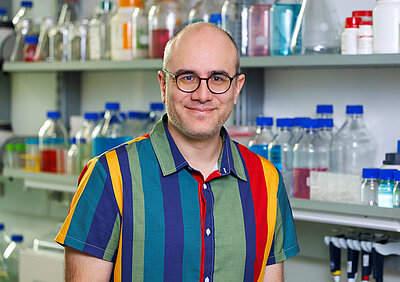AN INSIGHT INTO HOW DISCOVERIES ARE MADE AT IMBA
From the beginning of my application process, the level of professionalism was extremely high. Paperwork and interviews were organized efficiently, and I was welcome to meet other faculty members and the leaders of some of the associated facilities. That gave a very good first impression of the institute. Established support systems also make sure that a new group leader has everything they need to start their group, ensuring that the transition process is smooth and efficient.
The first objective of IMBA is to make its scientists successful. Everyone at IMBA actively tried to make us feel welcome and help us in every step of the way. For example, the Fly facility, which performed microinjections and genome engineering in Drosophila, offered to adapt their procedures to our model organism, nematodes, which hadn’t been used at the Vienna BioCenter before. The facility – now the Fly and Worm facility – has proved to be an invaluable resource for us over the years, streamlining the generation of novel animal models that are expanding the toolkit of the whole scientific community and opening new research opportunities. In addition, IMBA hosts scientists who work in very different fields, which encourages researchers to delve into areas that they wouldn’t have contemplated otherwise, enriching their own research and leading to new avenues. This creativity is not only encouraged but supported.
Researchers at IMBA are encouraged to follow their curiosity regardless of whether some of their projects take a long time to complete, meaning that we have the time to think about the best way to tackle big questions. This philosophy has ultimately proven to be very successful judging by the scientific achievements of the last years, including securing important and highly competitive funding.
Regardless of what external funding you may secure, the institute provides consistent and substantial funding for every research group. This unusual approach ensures a high level of stability that allows scientists to focus on doing high-quality research that takes big leaps, and not get stuck on incremental steps.
The highly collaborative and diverse scientific environment at IMBA and the Vienna BioCenter is an amazing resource. Having an open mind and being exposed to many different topics increases our general scientific knowledge and leads to new ideas that wouldn’t have existed otherwise. Being able to work on these ideas together with other research groups and combine our expertise is key to producing high-quality research.
My favorite thing as a Group Leader is getting three or four people together and brainstorming to find a solution to a scientific problem. This collaborative thinking between people with different scientific and technical expertise not only produces the best ideas, but also strengthens the bonds between colleagues.
The Core Facilities are an invaluable resource for our scientists. They provide state-of-the-art equipment and technologies, as well as dedicated experts who help us design, perform and analyze experiments. This is an amazing learning opportunity for our scientists to expand their knowledge and technical skills, while allowing us to bring our research to the next level. Having such a concentration of experts has helped the campus reach a critical mass of innovation and collaboration that makes it a unique environment for scientific discovery.
I help the researchers and students in my group to direct their efforts to the right scientific questions. Sometimes, having a preconceived idea of where your research is going to take you can limit creativity. You can get too enamored with a beautiful hypothesis and lose perspective.
My role is to provide resources and advice for students to learn how to narrow down their scientific questions to solvable problems. Another important aspect is helping students keep perspective on what is important about their research, instead of obsessing over little details. Additionally, I encourage my lab members to learn as much as possible about the field they’re studying, often even more than I know. This allows them to follow their curiosity and deviate from their original plans when an unexpected result or idea comes along.
Ultimately, the discoveries that arise from this kind of approach are the most rewarding and provide the biggest learning opportunities.
I strive to help my group members find the right balance between being personally involved in their projects and managing their own expectations. The lack of immediate reward inherent to the scientific process means you must believe strongly in yourself and your project to keep going. Persistence is often the key to success.
Another crucial element is fostering a healthy work-life balance. Scientists can get too invested in their projects, and it is good to have enough personal time outside of the lab to disconnect and clear one’s mind. Having a strong social circle is also a necessary foundation for success. This can be a struggle especially for international researchers, and creating a close-knit community in the lab and the institute is essential.
As a Group Leader, sometimes it’s necessary to take a step back and understand that science is an individual intellectual adventure that needs solid support. In my case, having a family and being a parent has helped me better understand the needs of other people and how to communicate with them. I encourage my group members to reach out to me when they are having personal issues so that I can give them the time and support they need. Also, it is important to understand that failures will happen, and that they are part of the process.
